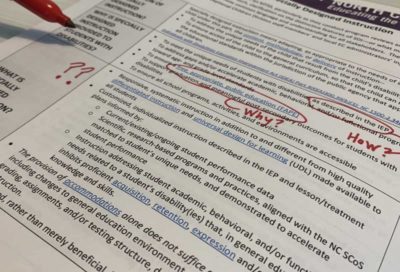
It’s been said many times — “Dyslexia is a rich man’s game.”
Parents who have money can hire a private tutor, an advocate, a literacy specialist, a lawyer; pay for very expensive private evaluations; and place their child in a private school where teachers have the knowledge and skill to teach a dyslexic child how to read. If you are a parent who is poor, or even middle class, and your dyslexic child attends a traditional public school in North Carolina, the road to literacy can be very challenging.
The first challenge a dyslexic child faces is early identification. It’s very important for dyslexic children to be identified early and for interventions to begin in the early grades. Dr. Sally Shaywitz, a well-known researcher who has dedicated her life to understanding how children learn to read, states in Overcoming Dyslexia, “The human brain is resilient, but there is no question that early intervention and treatment bring about more positive change at a faster pace than an intervention provided to an older child.”
In North Carolina during the 2018-19 school year, only 373 6-year-olds were eligible for Special Education in the category of Specific Learning Disabilities (SLD). In contrast, 7,691 12-year-olds received special education in the category of SLD. About 80% of children with learning differences are dyslexic.
| Disability category | Age 6 | Age 7 | Age 8 | Age 9 | Age 10 | Age 11 | Age 12 | Age 13 | Age 14 |
| Specific Learning Disability* | 373 | 1,743 | 4,386 | 6,028 | 6,986 | 7,656 | 7,691 | 7,439 | 7,227 |
If you are a parent with means and knowledge, you can go outside the public school system and your child will be identified and may receive critical early intervention privately, but what about the other children? Many parents depend on the public school system to have the knowledge and skills to identify and teach their dyslexic child how to read.
It’s clear, by the North Carolina Department of Public Instruction’s (DPI) own numbers, that schools across the state are not successful in early identification of children who have a disability in phonological processing. The delay in identification allows the reading gap between dyslexic children and their peers to widen. A critical window is lost.
The next challenge for a dyslexic child is finding a teacher who is knowledgeable in the science of reading, understands dyslexia, and has the skills to teach reading in way that is direct, explicit, multi-sensory, structured, sequential, diagnostic, and prescriptive. You would think this wouldn’t be such a challenge, but many educator preparation programs in across the county have not embraced the science of reading.
The Science of Reading refers to the many decades of cognitive research on how children learn to read. Unfortunately, whole language and the “three cueing system” is widely used across the county. Here’s an example of how the “three cueing system” is implemented.

Parents of dyslexic children have come together to meet this challenge. Literacy Moms NC was born out of an effort to join the different dyslexia groups and parents across the state. We have worked tirelessly to raise awareness and educate parents, superintendents, teachers, and policymakers about the science of reading and the challenges that dyslexic children, and all children, face in the public school system.
The question has become, “How can we affect real change? Actual change. How is a dyslexic child going to be given appropriate remediation if parents don’t have the money for lawyers, reading specialists, advocates, and private tutors or schools?”
This is a question about my belief in the fundamental right of literacy, equity, equal access to education, and the duty of the state to guard and maintain the right of an education. (Article 1, Sec. 15 of the North Carolina Constitution declares that “The people have a right to the privilege of education, and it is the duty of the State to guard and maintain that right.”)
We, Literacy Moms NC, have embarked on a State Compliant campaign as a way to force DPI to exercise their duties to supervise and monitor schools and school systems in the area of Child Find and Special Education.
Early identification is a critical step, and the implementation of Response to Intervention (RTI) is the focus of our first State Complaint against the state. The state must have a process in place to enforce compliance with the Individuals with Disabilities Education Act (IDEA). It is not enough to tell a school district “this is the way RTI should be implemented” and then have no process in place to monitor and supervise school districts and, when needed, enforce IDEA.
There must be a free pathway for dyslexic children, for all children, to have the fundamental right of literacy.
Recommended reading



